Pharmaceutical Ethics and Patient Safety: An In-depth Film Review
VerifiedAdded on 2023/06/11
|6
|1233
|182
Essay
AI Summary
This essay presents a film review centered on the documentary 'Money Talks: Profits Before Patient Safety,' critically analyzing the ethical issues within the pharmaceutical industry. The review discusses the film's portrayal of pharmaceutical companies prioritizing profits over patient well-being through questionable marketing tactics and overpricing of life-saving drugs. It reflects on personal experiences related to overpriced medications and explores the ethical implications for healthcare providers and the pharmaceutical industry, connecting these issues to ethical principles and theories. The essay also proposes potential solutions, such as stricter regulations, promotion of generic medicines, and increased transparency in drug pricing, to address the misleading practices and ensure patient safety. This resource, contributed by a student, is available on Desklib, which provides a wealth of study tools and solved assignments for students.

Running head: FILM REVIEW
FILM REVIEW
Name of the Student
Name of the university
Author’s note
FILM REVIEW
Name of the Student
Name of the university
Author’s note
Paraphrase This Document
Need a fresh take? Get an instant paraphrase of this document with our AI Paraphraser
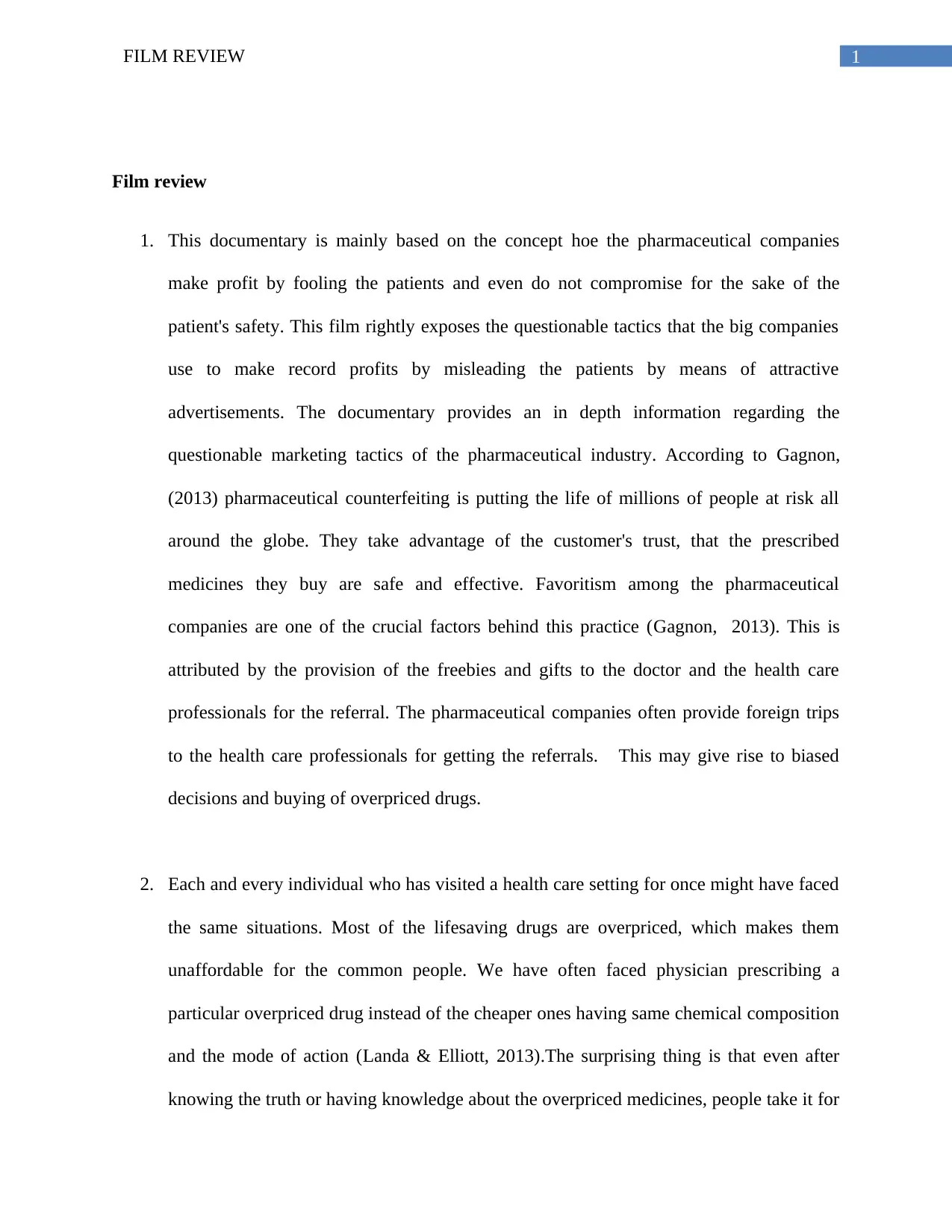
1FILM REVIEW
Film review
1. This documentary is mainly based on the concept hoe the pharmaceutical companies
make profit by fooling the patients and even do not compromise for the sake of the
patient's safety. This film rightly exposes the questionable tactics that the big companies
use to make record profits by misleading the patients by means of attractive
advertisements. The documentary provides an in depth information regarding the
questionable marketing tactics of the pharmaceutical industry. According to Gagnon,
(2013) pharmaceutical counterfeiting is putting the life of millions of people at risk all
around the globe. They take advantage of the customer's trust, that the prescribed
medicines they buy are safe and effective. Favoritism among the pharmaceutical
companies are one of the crucial factors behind this practice (Gagnon, 2013). This is
attributed by the provision of the freebies and gifts to the doctor and the health care
professionals for the referral. The pharmaceutical companies often provide foreign trips
to the health care professionals for getting the referrals. This may give rise to biased
decisions and buying of overpriced drugs.
2. Each and every individual who has visited a health care setting for once might have faced
the same situations. Most of the lifesaving drugs are overpriced, which makes them
unaffordable for the common people. We have often faced physician prescribing a
particular overpriced drug instead of the cheaper ones having same chemical composition
and the mode of action (Landa & Elliott, 2013).The surprising thing is that even after
knowing the truth or having knowledge about the overpriced medicines, people take it for
Film review
1. This documentary is mainly based on the concept hoe the pharmaceutical companies
make profit by fooling the patients and even do not compromise for the sake of the
patient's safety. This film rightly exposes the questionable tactics that the big companies
use to make record profits by misleading the patients by means of attractive
advertisements. The documentary provides an in depth information regarding the
questionable marketing tactics of the pharmaceutical industry. According to Gagnon,
(2013) pharmaceutical counterfeiting is putting the life of millions of people at risk all
around the globe. They take advantage of the customer's trust, that the prescribed
medicines they buy are safe and effective. Favoritism among the pharmaceutical
companies are one of the crucial factors behind this practice (Gagnon, 2013). This is
attributed by the provision of the freebies and gifts to the doctor and the health care
professionals for the referral. The pharmaceutical companies often provide foreign trips
to the health care professionals for getting the referrals. This may give rise to biased
decisions and buying of overpriced drugs.
2. Each and every individual who has visited a health care setting for once might have faced
the same situations. Most of the lifesaving drugs are overpriced, which makes them
unaffordable for the common people. We have often faced physician prescribing a
particular overpriced drug instead of the cheaper ones having same chemical composition
and the mode of action (Landa & Elliott, 2013).The surprising thing is that even after
knowing the truth or having knowledge about the overpriced medicines, people take it for
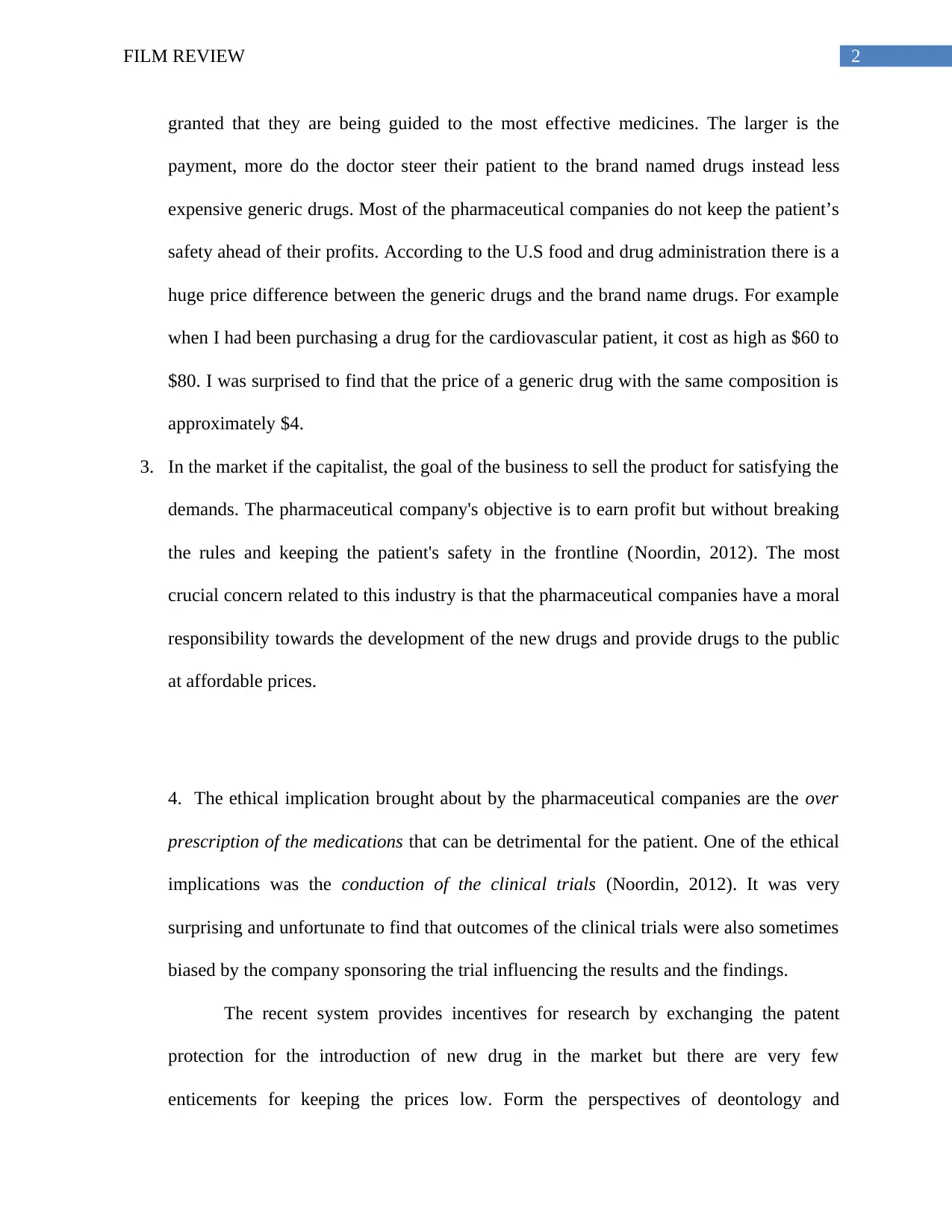
2FILM REVIEW
granted that they are being guided to the most effective medicines. The larger is the
payment, more do the doctor steer their patient to the brand named drugs instead less
expensive generic drugs. Most of the pharmaceutical companies do not keep the patient’s
safety ahead of their profits. According to the U.S food and drug administration there is a
huge price difference between the generic drugs and the brand name drugs. For example
when I had been purchasing a drug for the cardiovascular patient, it cost as high as $60 to
$80. I was surprised to find that the price of a generic drug with the same composition is
approximately $4.
3. In the market if the capitalist, the goal of the business to sell the product for satisfying the
demands. The pharmaceutical company's objective is to earn profit but without breaking
the rules and keeping the patient's safety in the frontline (Noordin, 2012). The most
crucial concern related to this industry is that the pharmaceutical companies have a moral
responsibility towards the development of the new drugs and provide drugs to the public
at affordable prices.
4. The ethical implication brought about by the pharmaceutical companies are the over
prescription of the medications that can be detrimental for the patient. One of the ethical
implications was the conduction of the clinical trials (Noordin, 2012). It was very
surprising and unfortunate to find that outcomes of the clinical trials were also sometimes
biased by the company sponsoring the trial influencing the results and the findings.
The recent system provides incentives for research by exchanging the patent
protection for the introduction of new drug in the market but there are very few
enticements for keeping the prices low. Form the perspectives of deontology and
granted that they are being guided to the most effective medicines. The larger is the
payment, more do the doctor steer their patient to the brand named drugs instead less
expensive generic drugs. Most of the pharmaceutical companies do not keep the patient’s
safety ahead of their profits. According to the U.S food and drug administration there is a
huge price difference between the generic drugs and the brand name drugs. For example
when I had been purchasing a drug for the cardiovascular patient, it cost as high as $60 to
$80. I was surprised to find that the price of a generic drug with the same composition is
approximately $4.
3. In the market if the capitalist, the goal of the business to sell the product for satisfying the
demands. The pharmaceutical company's objective is to earn profit but without breaking
the rules and keeping the patient's safety in the frontline (Noordin, 2012). The most
crucial concern related to this industry is that the pharmaceutical companies have a moral
responsibility towards the development of the new drugs and provide drugs to the public
at affordable prices.
4. The ethical implication brought about by the pharmaceutical companies are the over
prescription of the medications that can be detrimental for the patient. One of the ethical
implications was the conduction of the clinical trials (Noordin, 2012). It was very
surprising and unfortunate to find that outcomes of the clinical trials were also sometimes
biased by the company sponsoring the trial influencing the results and the findings.
The recent system provides incentives for research by exchanging the patent
protection for the introduction of new drug in the market but there are very few
enticements for keeping the prices low. Form the perspectives of deontology and
⊘ This is a preview!⊘
Do you want full access?
Subscribe today to unlock all pages.

Trusted by 1+ million students worldwide
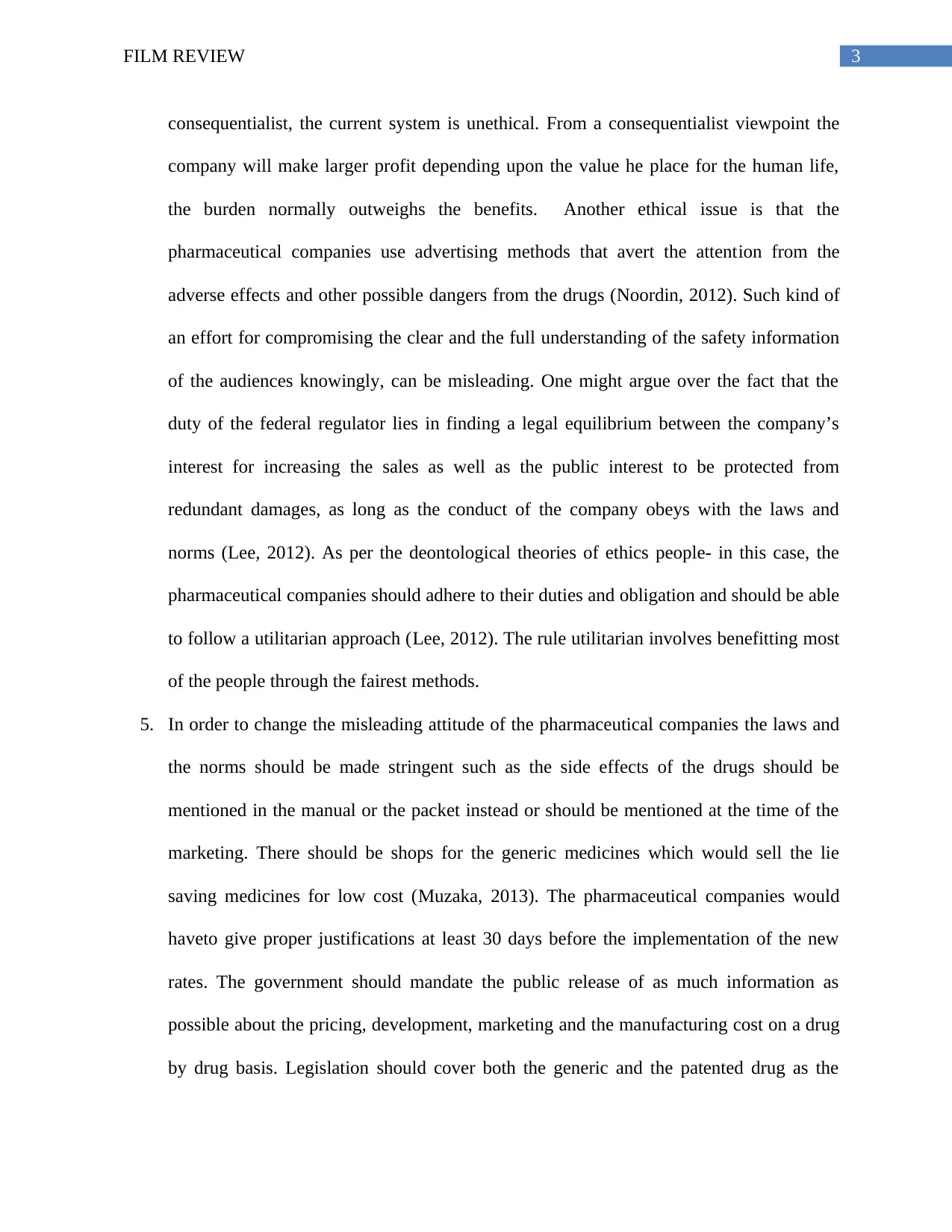
3FILM REVIEW
consequentialist, the current system is unethical. From a consequentialist viewpoint the
company will make larger profit depending upon the value he place for the human life,
the burden normally outweighs the benefits. Another ethical issue is that the
pharmaceutical companies use advertising methods that avert the attention from the
adverse effects and other possible dangers from the drugs (Noordin, 2012). Such kind of
an effort for compromising the clear and the full understanding of the safety information
of the audiences knowingly, can be misleading. One might argue over the fact that the
duty of the federal regulator lies in finding a legal equilibrium between the company’s
interest for increasing the sales as well as the public interest to be protected from
redundant damages, as long as the conduct of the company obeys with the laws and
norms (Lee, 2012). As per the deontological theories of ethics people- in this case, the
pharmaceutical companies should adhere to their duties and obligation and should be able
to follow a utilitarian approach (Lee, 2012). The rule utilitarian involves benefitting most
of the people through the fairest methods.
5. In order to change the misleading attitude of the pharmaceutical companies the laws and
the norms should be made stringent such as the side effects of the drugs should be
mentioned in the manual or the packet instead or should be mentioned at the time of the
marketing. There should be shops for the generic medicines which would sell the lie
saving medicines for low cost (Muzaka, 2013). The pharmaceutical companies would
haveto give proper justifications at least 30 days before the implementation of the new
rates. The government should mandate the public release of as much information as
possible about the pricing, development, marketing and the manufacturing cost on a drug
by drug basis. Legislation should cover both the generic and the patented drug as the
consequentialist, the current system is unethical. From a consequentialist viewpoint the
company will make larger profit depending upon the value he place for the human life,
the burden normally outweighs the benefits. Another ethical issue is that the
pharmaceutical companies use advertising methods that avert the attention from the
adverse effects and other possible dangers from the drugs (Noordin, 2012). Such kind of
an effort for compromising the clear and the full understanding of the safety information
of the audiences knowingly, can be misleading. One might argue over the fact that the
duty of the federal regulator lies in finding a legal equilibrium between the company’s
interest for increasing the sales as well as the public interest to be protected from
redundant damages, as long as the conduct of the company obeys with the laws and
norms (Lee, 2012). As per the deontological theories of ethics people- in this case, the
pharmaceutical companies should adhere to their duties and obligation and should be able
to follow a utilitarian approach (Lee, 2012). The rule utilitarian involves benefitting most
of the people through the fairest methods.
5. In order to change the misleading attitude of the pharmaceutical companies the laws and
the norms should be made stringent such as the side effects of the drugs should be
mentioned in the manual or the packet instead or should be mentioned at the time of the
marketing. There should be shops for the generic medicines which would sell the lie
saving medicines for low cost (Muzaka, 2013). The pharmaceutical companies would
haveto give proper justifications at least 30 days before the implementation of the new
rates. The government should mandate the public release of as much information as
possible about the pricing, development, marketing and the manufacturing cost on a drug
by drug basis. Legislation should cover both the generic and the patented drug as the
Paraphrase This Document
Need a fresh take? Get an instant paraphrase of this document with our AI Paraphraser
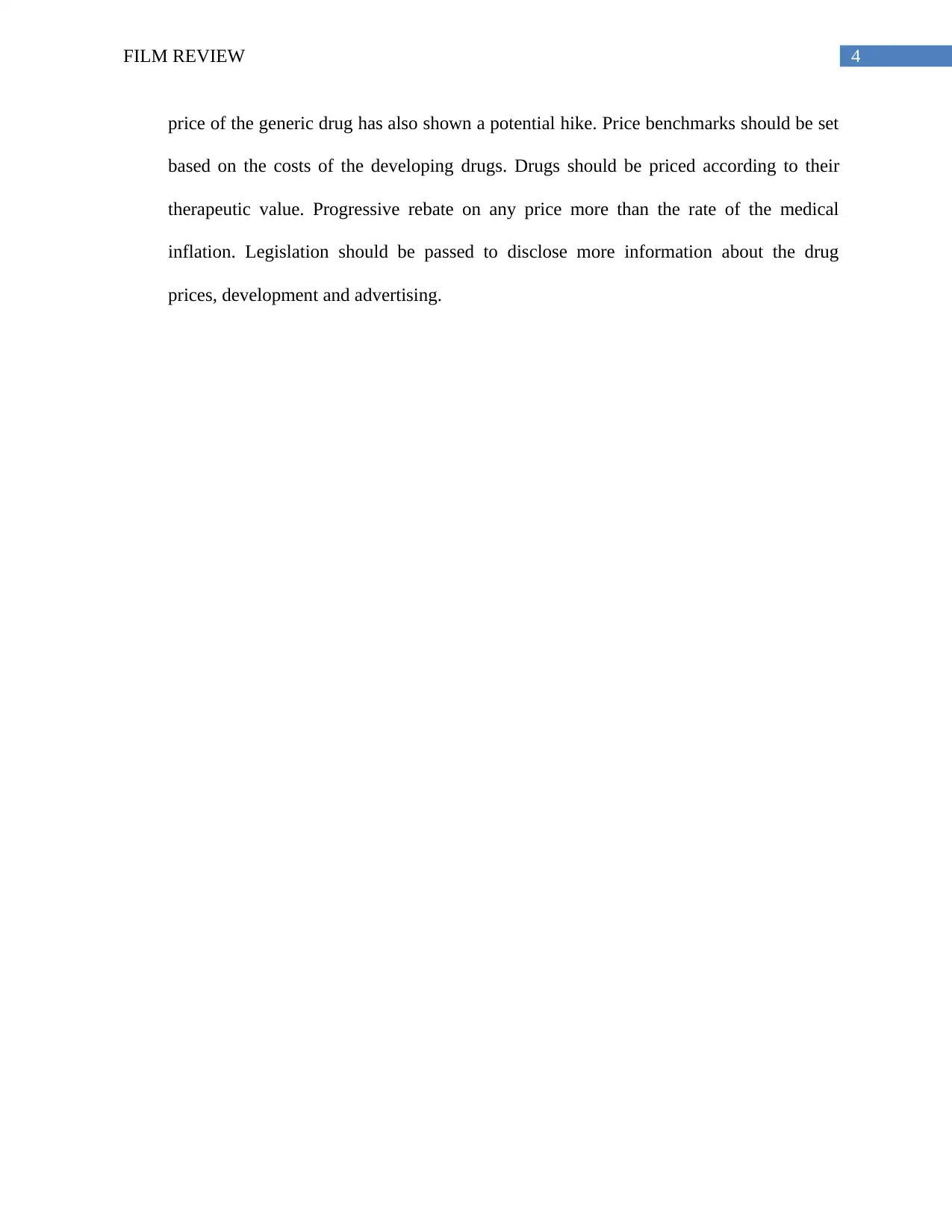
4FILM REVIEW
price of the generic drug has also shown a potential hike. Price benchmarks should be set
based on the costs of the developing drugs. Drugs should be priced according to their
therapeutic value. Progressive rebate on any price more than the rate of the medical
inflation. Legislation should be passed to disclose more information about the drug
prices, development and advertising.
price of the generic drug has also shown a potential hike. Price benchmarks should be set
based on the costs of the developing drugs. Drugs should be priced according to their
therapeutic value. Progressive rebate on any price more than the rate of the medical
inflation. Legislation should be passed to disclose more information about the drug
prices, development and advertising.
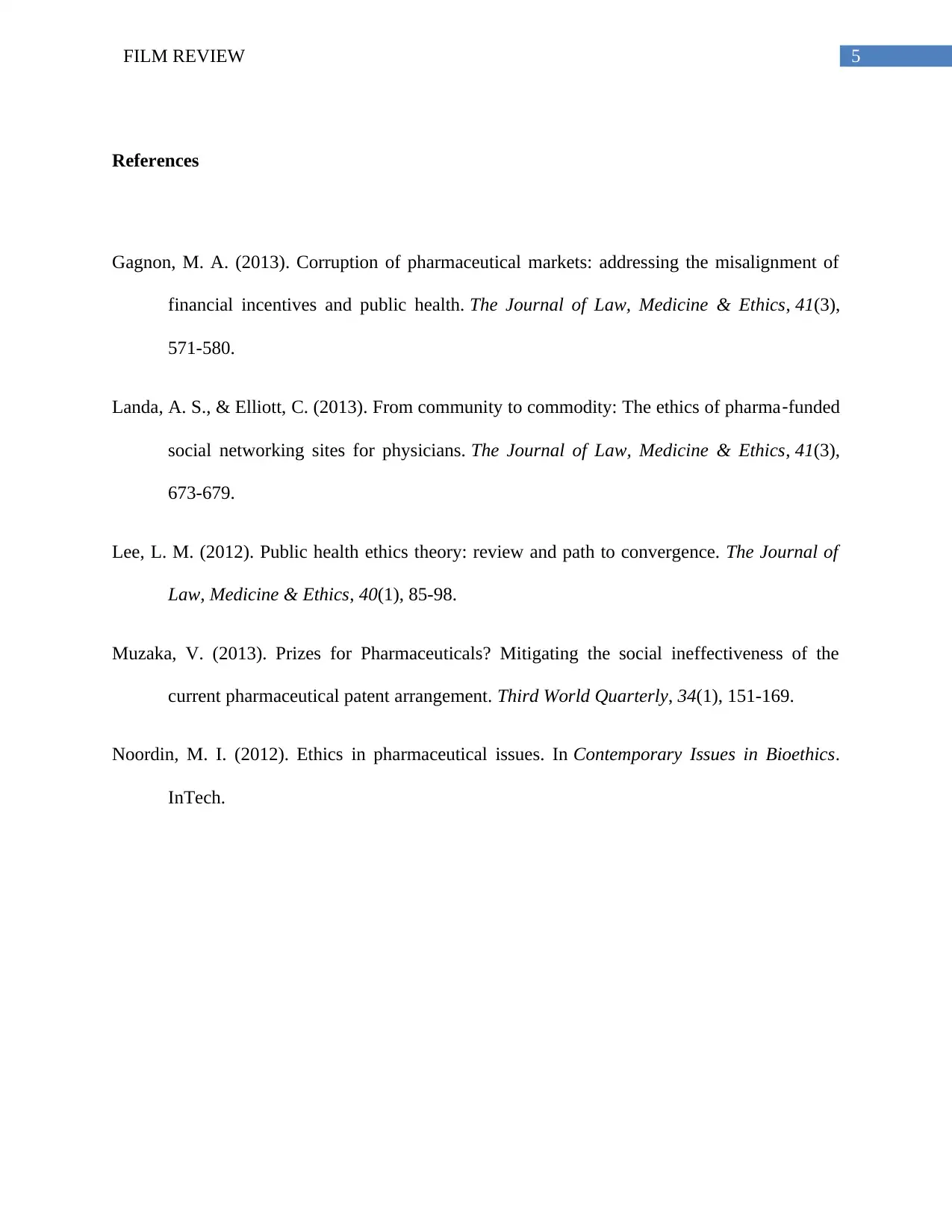
5FILM REVIEW
References
Gagnon, M. A. (2013). Corruption of pharmaceutical markets: addressing the misalignment of
financial incentives and public health. The Journal of Law, Medicine & Ethics, 41(3),
571-580.
Landa, A. S., & Elliott, C. (2013). From community to commodity: The ethics of pharma‐funded
social networking sites for physicians. The Journal of Law, Medicine & Ethics, 41(3),
673-679.
Lee, L. M. (2012). Public health ethics theory: review and path to convergence. The Journal of
Law, Medicine & Ethics, 40(1), 85-98.
Muzaka, V. (2013). Prizes for Pharmaceuticals? Mitigating the social ineffectiveness of the
current pharmaceutical patent arrangement. Third World Quarterly, 34(1), 151-169.
Noordin, M. I. (2012). Ethics in pharmaceutical issues. In Contemporary Issues in Bioethics.
InTech.
References
Gagnon, M. A. (2013). Corruption of pharmaceutical markets: addressing the misalignment of
financial incentives and public health. The Journal of Law, Medicine & Ethics, 41(3),
571-580.
Landa, A. S., & Elliott, C. (2013). From community to commodity: The ethics of pharma‐funded
social networking sites for physicians. The Journal of Law, Medicine & Ethics, 41(3),
673-679.
Lee, L. M. (2012). Public health ethics theory: review and path to convergence. The Journal of
Law, Medicine & Ethics, 40(1), 85-98.
Muzaka, V. (2013). Prizes for Pharmaceuticals? Mitigating the social ineffectiveness of the
current pharmaceutical patent arrangement. Third World Quarterly, 34(1), 151-169.
Noordin, M. I. (2012). Ethics in pharmaceutical issues. In Contemporary Issues in Bioethics.
InTech.
⊘ This is a preview!⊘
Do you want full access?
Subscribe today to unlock all pages.

Trusted by 1+ million students worldwide
1 out of 6
Related Documents
Your All-in-One AI-Powered Toolkit for Academic Success.
+13062052269
info@desklib.com
Available 24*7 on WhatsApp / Email
![[object Object]](/_next/static/media/star-bottom.7253800d.svg)
Unlock your academic potential
Copyright © 2020–2025 A2Z Services. All Rights Reserved. Developed and managed by ZUCOL.




